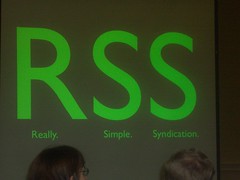I had the pleasure of attending the Science Blogging Conference in Chapel Hill last weekend. It was a good conference, but not like the conferences that I usually work at. First of all, the sessions followed an un-conference format — though many of the presenters had a pretty hard time adhering to that formula. The goal of an un-conference session is to generate conversations among the audience that teach, rather than simply teaching the group. But some great conversations happened any, and one of the best that I was a part of was with a young man I sat and had box lunch with out in the Quad under the sun.
I do not recall his name, but he was a writer/journalist by trade, and he was attending this conference in his capacity as a writer for Duke University. His job involves translating what scientists are doing into language that ex-history teachers like me can understand. We talked for a while around our delicious wrap sandwiches, provided by the conference, and one thread that we followed for a bit was about video games, as his children are just now beginning to play them.
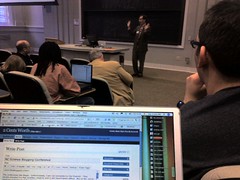 |
| Click here to see a slide show of pictures taken at the conference by attendees and then flickr’ed. |
I finally asked if he was noticing any differences between the younger scientists he works with (20s and early 30s) and the older scientists (closer to my age), that might be attributed to the former being digital natives. He said that he did see that the younger scientists were much more eager to collaborate electronically, that distances seemed to mean very little to them in their work. He very quickly added that the older scientists were catching on and adopting collaborative technologies very quickly, but that adoption was a step that they had to go through.
He also said that he was seeing another shift that I found quite interesting. He said that science use to be reductionist in nature. I asked what that meant, and he said that science was about drilling down to components, cutting out and examining bits of the world, reducing it to its barest fundamentals. He said that the younger scientist spend more time synthesizing, that they seem much more interested in systems and networks, not so much how things operate independently, but how they operate as part of a larger organism, ecosystem, or cosmos.
I suspect that all kinds of speculation might be made about why science seems, at least in the eyes of this science communicator, to be shifting, and one could probably make a case relating it to younger scientists digital experiences. The connection that occurred to me, however, was with schools, which seem to me to be in a reductionist mode still. On Saturday, I presented with Nancy Willard at the NSBA Leadership Conference, a gathering of state affiliate presidents and executive directors. After our presentations, we fielded questions from the audience.
The first questioner wanted to know how they could get their hands on an RSS aggregator. 😉
Then someone asked if the literacy skills that I was talking about were part of anyone’s curriculum. The answer is, “Yes!” My own state, for one, has been teaching and testing computer skills for more than ten years. However, it is a reductionist response to the need for digital literacy (what I call contemporary literacy). We have reduced computer skills out into their own list of standards, separated again into objectives, and performance indicators. We’ve reduced it down to components that can be discretely measured.
I don’t think that this happens entirely because of the industrial mechanized environment that many of us come from. I think it’s just easier to separate things out and teach them in isolation, especially when we believe that our job is to simply teach.
I maintain that the best solution to integrating contemporary literacy (digital literacy, information skills, computer skills, whatever you want to call it.) into what and how we teach is simple. It’s dramatic, but its simple — because teachers will do what helps them do their jobs. Teachers will do what solves their problems.
So the solution is to give them a problem.
Take all the paper out of every classroom and replace it with access to digital content, and put digital/networked information tools in the hands of every teacher and learner. Then say, “Now teach! Now Learn!”
Of course you’re going to have to provide them with time for retooling, and a little staff development, but it will happen, when they have little choice.
2¢ Worth!
Technorati Tags: warlick education technology digitalliteracy literacy
 Brenda and I are leaving tomorrow morning for San Francisco and the TRLD conference, at the Hyatt Regency. I’ve attended and worked this conference a few times, and it is one of the best small gatherings I have experienced. This is partly because of the range of interests. The TRLD stands for Technology, Reading, and Learning Disabilities. Another reason why the conference is so good, is that many of the attendees come back, year after year. It is something of a community of educators from across the U.S. and I’ve made some great friends here.
Brenda and I are leaving tomorrow morning for San Francisco and the TRLD conference, at the Hyatt Regency. I’ve attended and worked this conference a few times, and it is one of the best small gatherings I have experienced. This is partly because of the range of interests. The TRLD stands for Technology, Reading, and Learning Disabilities. Another reason why the conference is so good, is that many of the attendees come back, year after year. It is something of a community of educators from across the U.S. and I’ve made some great friends here.



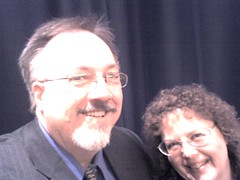 After the signing we remained at the desk and talked into my iPod, which will probably be Episode 79, of
After the signing we remained at the desk and talked into my iPod, which will probably be Episode 79, of 
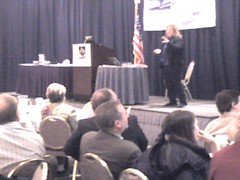
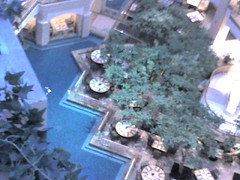
 Content is becoming increasingly networked, digital, overwhelming. Perhaps even more crucial to this discussion is the fact that information has become nearly impossible to contain. You can’t keep it in a book, on a book shelf, in a library, in alphabetical order in an encyclopedia, or even on the top shelf of the magazine rack in your local drug store. It flows on its own and is called up in ways that would have seemed completely foreign to me when I started teaching and the last half of the last century.
Content is becoming increasingly networked, digital, overwhelming. Perhaps even more crucial to this discussion is the fact that information has become nearly impossible to contain. You can’t keep it in a book, on a book shelf, in a library, in alphabetical order in an encyclopedia, or even on the top shelf of the magazine rack in your local drug store. It flows on its own and is called up in ways that would have seemed completely foreign to me when I started teaching and the last half of the last century. 